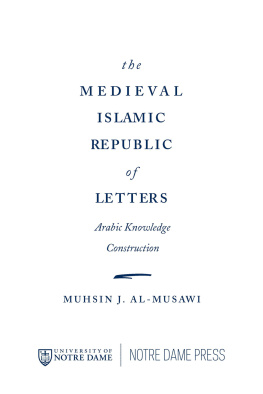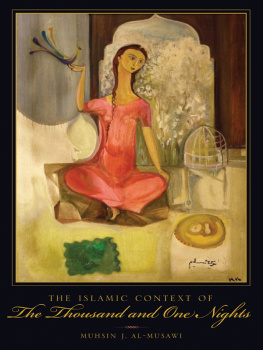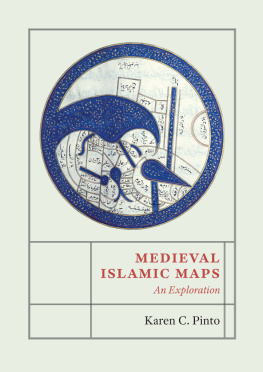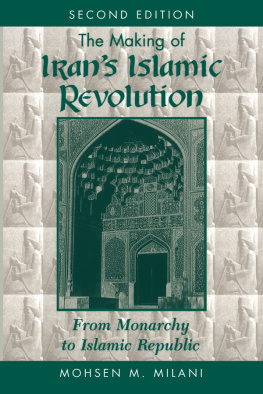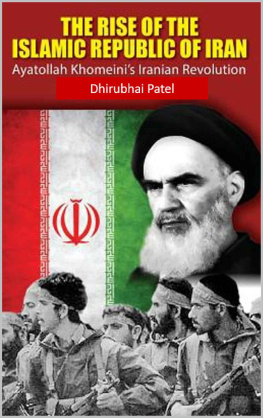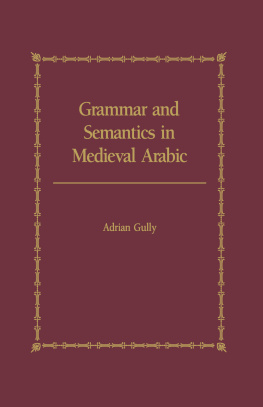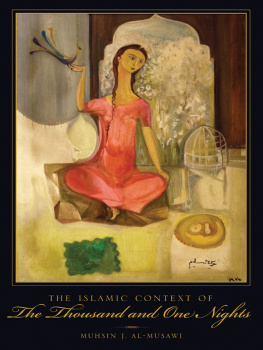Musawi - The medieval Islamic republic of letters Arabic knowledge construction
Here you can read online Musawi - The medieval Islamic republic of letters Arabic knowledge construction full text of the book (entire story) in english for free. Download pdf and epub, get meaning, cover and reviews about this ebook. City: Notre Dame;Ind, year: 2015;2017, publisher: University of Notre Dame Press, genre: Home and family. Description of the work, (preface) as well as reviews are available. Best literature library LitArk.com created for fans of good reading and offers a wide selection of genres:
Romance novel
Science fiction
Adventure
Detective
Science
History
Home and family
Prose
Art
Politics
Computer
Non-fiction
Religion
Business
Children
Humor
Choose a favorite category and find really read worthwhile books. Enjoy immersion in the world of imagination, feel the emotions of the characters or learn something new for yourself, make an fascinating discovery.
- Book:The medieval Islamic republic of letters Arabic knowledge construction
- Author:
- Publisher:University of Notre Dame Press
- Genre:
- Year:2015;2017
- City:Notre Dame;Ind
- Rating:4 / 5
- Favourites:Add to favourites
- Your mark:
- 80
- 1
- 2
- 3
- 4
- 5
The medieval Islamic republic of letters Arabic knowledge construction: summary, description and annotation
We offer to read an annotation, description, summary or preface (depends on what the author of the book "The medieval Islamic republic of letters Arabic knowledge construction" wrote himself). If you haven't found the necessary information about the book — write in the comments, we will try to find it.
Musawi: author's other books
Who wrote The medieval Islamic republic of letters Arabic knowledge construction? Find out the surname, the name of the author of the book and a list of all author's works by series.
The medieval Islamic republic of letters Arabic knowledge construction — read online for free the complete book (whole text) full work
Below is the text of the book, divided by pages. System saving the place of the last page read, allows you to conveniently read the book "The medieval Islamic republic of letters Arabic knowledge construction" online for free, without having to search again every time where you left off. Put a bookmark, and you can go to the page where you finished reading at any time.
Font size:
Interval:
Bookmark:

The Medieval Islamic Republic of Letters
the
MEDIEVAL ISLAMIC REPUBLIC
of
LETTERS
Arabic Knowledge
Construction

MUHSIN J. AL-MUSAWI
University of Notre Dame Press
Notre Dame, Indiana
University of Notre Dame Press
Notre Dame, Indiana 46556
www.undpress.nd.edu
All Rights Reserved
Copyright 2015 by the University of Notre Dame
Published in the United States of America
Library of Congress Cataloging-in-Publication Data
Musawi, Muhsin Jasim, author.
The medieval Islamic republic of letters : Arabic knowledge construction / Muhsin J. al-Musawi.
pagescm
Includes bibliographical references and index.
ISBN 978-0-268-02044-6 (paperback)
ISBN 0-268-02044-2 (paper)
1. Arabic literature12581800History and criticism.2. Islamic literatureHistory and criticism.I. Title.
PJ7535.M872015
892.7'09004dc23
2014047954
ISBN 9780268158019
The paper in this book meets the guidelines for permanence and durability of the Committee on Production Guidelines for Book Longevity of the Council on Library Resources.
This e-Book was converted from the original source file by a third-party vendor. Readers who notice any formatting, textual, or readability issues are encouraged to contact the publisher at .
CONTENTS
My interest in the Arabic thrust of medieval and premodern Islamic culture has a long history, and it is certainly bound up with my engagement with the Thousand and One Nights (The Arabian Nights). The material that I collected and worked on regarding medieval Islamic culture took many directions later, and from the present project another one has branched off with a focus on the complexity of the nahah (the modern Arab awakening or renaissance, as it is often called). But, practically speaking, the current book started with two invitations early in 2001, the first from the editors for Arabic Literature in the Post-Classical Period, Roger Allen and D. S. Richards, who invited me to write a survey essay, published under the title Pre-modern Belletrist Prose, covering the prose section in that volume. I hereby express my gratitude to both of these editors and to the publisher, Cambridge University Press, and in particular to my dear friend Roger Allen, who cherished the book and provided generous suggestions and support throughout the years of preparation. I also extend thanks to Bruce Craig and to Th. Emil Homerin for the invitation to participate in the Mamluk Studies Review issue on Mamluk literature, with my essay Vindicating a Profession or a Personal Career? Al-Qalqashands Maqamah in Context. Without their devotion to Mamluk studies, many scholars would not risk treading in this thinly nurtured field. Although these two essays are not included in the present book, they are nevertheless part of the background that substantiates its argument. Many thanks are due to Marlis Salih, editor for Mamluk Studies Review, for reproducing part of Islamic Literary World-System: The Lexicographic Turn (Mamluk Studies Review 17, 2013), and for the invitation to give a talk on the medieval Islamic republic of letters at the University of Chicago, April 27, 2012. The two anonymous readers for the University of Notre Dame Press were no less helpful in providing extensive notes and queries. I also need to thank my colleagues and friends Suzanne P. Stetkevych at Georgetown University and Li Guo at the University of Notre Dame for their invaluable comments and notes. Thanks are due as well to my former students and present colleagues Anne-Marie McManus at Washington University in St. Louis and Nizar Hermes at the University of Oklahoma for going through an early version of the manuscript and making some insightful suggestions. I also thank my colleagues Moneera al-Ghadeer, Visiting Professor at Harvard University, and Bilal al-Orfali from the American University of Beirut for helping in the acquisition of some relevant material. To my assistant Joscelyn Shawn Ganjhara Jurich go sincere thanks for helping out in locating images; and similar thanks go to the Turkish scholar Osman Yilmaz.
For their help with a generous subvention, I express gratitude to the Warner Fund of the University Seminars at Columbia University. Ideas in this book were presented early on at the University Seminar on Arabic Studies, and I express gratitude to the discussants, George Saliba, Richard Bulliet, and Pierre Cachia. For the reproduction of images and illustrations, thanks and acknowledgments are due to the Beinecke Rare Book & Manuscript Library, Yale University, and to Moira Fitzgerald in particular for her help; to Houghton Library at Harvard University, and to Mary Haegert and Robert Zinck for making the acquisition of images a smooth process; to Dr al-Ilm lil-Malyn for reproduction of images from their publication Mulat fi al-shir al-Mamlk wa-al-Uthmn; and to Sleymaniye Library, Esad Efendi 3638, Istanbul, for the reproduction of the image from Ikhwn al-af. My warm gratitude goes to my friend the Iraqi painter Dhia Azzawi for providing the art for the cover of this book; and to Wendy McMillen from the Press for her attention to artistic production.
Warm thanks go to Stephen Little, the acquisition editor at the University of Notre Dame Press, for his early interest in the project and his keen attention to every step in the acquisitions process. I am also particularly impressed by the painstaking and thorough attention showed by Rebecca DeBoer, the copy editor at the Press. Her focus on every detail, keen eye, and pertinent suggestions are unique and deserve the highest appreciation. It would be churlish not to end with thanks to my family (Bahira, my daughters Wafa and Zainab, and my son Adnan), who have to suffer through my long hours of preoccupation with other people of premodern times.
The following are reproduced in the gallery after p. 146.
.
.
.
.
.
.
.
.
This book argues that the large-scale and diverse cultural production in Arabic in the postclassical era (approximately the twelfth through the eighteenth centuries) was the outcome of an active sphere of discussion and disputation spanning the entire medieval Muslim world.1 I explore this production over a long temporal stretch and across a vast swathe of Islamic territories. My focus is on the thematic and genealogical constructions that were of greatest significance to the accumulation of cultural capital, which, I argue, constitutes a medieval Islamic republic of letters.2 My emphasis is also on human agency and on the sites and methods of conversation, discussion, compilation, and writing that are of most relevance to the development of this communicative sphere. Although the fact that Arabic is the language of the Qurn necessarily entails its dominance in the battle to ensure a place for vernacular literatures, I redirect attention away from that battle and toward individual writers, grammarians, and lexicographers as active players in a larger Islamic cultural pursuit.
The pervasive Islamic consciousness that takes the Arabic language as its pivotal point, given its bearing on Qurnic studies and the emerging strategies of study and discourse, seems more important here than a metropolitan-peripheral demarcation, despite the marked presence of local, regional, and national production. Under precarious and ever-shifting politics, centers at any given time may be replaced by other centers, and scholars are compelled to develop their own counterstrategies in a vast Islamic domain where theological studies hold sway. Thus, the issue of centers and peripheries is secondary in relation to cultural activity. Arabic grammar, for instance, which is basic to training in the religious sciences,
Next pageFont size:
Interval:
Bookmark:
Similar books «The medieval Islamic republic of letters Arabic knowledge construction»
Look at similar books to The medieval Islamic republic of letters Arabic knowledge construction. We have selected literature similar in name and meaning in the hope of providing readers with more options to find new, interesting, not yet read works.
Discussion, reviews of the book The medieval Islamic republic of letters Arabic knowledge construction and just readers' own opinions. Leave your comments, write what you think about the work, its meaning or the main characters. Specify what exactly you liked and what you didn't like, and why you think so.

